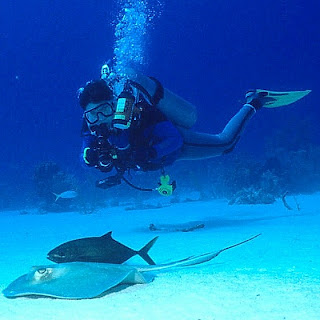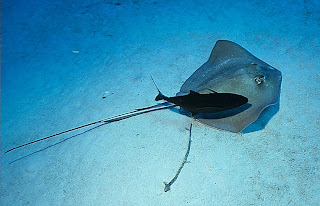 Recently someone asked us, "How come there are hardly any pictures of Bobbie on The Right Blue?" The answer to that question is that I've always been the one behind the camera instead of in front of it. As a result, we have very few underwater photos of me.
Recently someone asked us, "How come there are hardly any pictures of Bobbie on The Right Blue?" The answer to that question is that I've always been the one behind the camera instead of in front of it. As a result, we have very few underwater photos of me.Ever since we began The Right Blue, Jerry has been going through the thousands of slides we had stashed away, methodically looking for the ones that have a story. Several days ago he came across the one at right. Fortunately it was filed away along with the one below. Jerry scanned them both and passed the images to me to write about.
The first photo was taken by a dive guide and given to me as a souvenir of a trip we made to the Turks and Caicos islands. That's me, stalking my prey -- sneaking up on an interesting photo subject.
The second image is the photo I snapped a few moments later. I had followed this pair of critters around the sand flat for nearly ten minutes before they lined up just right for me to take the shot. I've mentioned in earlier posts that I really love to take pictures of critters' faces and especially their eyes. My next favorite theme after faces and eyes is behavior.
 The dark colored fish in the photo is a Bar Jack (Caranx ruber). This fish makes its living as an opportunistic feeder, so it is swimming along a little above and behind a Southern Stingray (Dasyatis americana) hoping to snag a free lunch.
The dark colored fish in the photo is a Bar Jack (Caranx ruber). This fish makes its living as an opportunistic feeder, so it is swimming along a little above and behind a Southern Stingray (Dasyatis americana) hoping to snag a free lunch.The stingray rummages in the sand looking for little creatures to eat -- worms, small clams, tiny crabs, and such. To locate its prey, it fans away the top layer the sand by fluttering its wingtips.
The crafty Bar Jack follows closely, letting the stingray do the excavating. If the stingray uncovers something that looks tasty to the Bar Jack, the jack will snatch it in a lightning strike, then resume its position keeping watch over the stingray's shoulder, as it were.
We've seen Bar Jacks throughout the Caribbean. In addition to pairing with hunting stingrays, we've also seen them following goatfish -- another species that digs around in the sand and rubble for food.
By the way, the Bar Jack doesn't always look so dark. When it's not feeding, it is a handsome silvery blue color, with a black bar running along its back from its dorsal fin down to the lower lobe of its tail fin like a racing stripe.

BNSullivan.jpg)
BNSullivan930x600.jpg)
BNSullivan.jpg)
BNSullivan.jpg)

BNSullivan.jpg)
BNSullivan.jpg)



The Bar Jack reminds of the birds that stand on the backs of the hippos and rhinos. So he turns black when he is eating?
ReplyDeleteHi Kathy -
ReplyDeleteYes, the Bar Jacks go dark while they hunt and feed. Sort of like dressing for dinner. ;-}
Bobbie
Very neat image!
ReplyDeleteThanks, Bernie.
ReplyDeleteNeedless to say, this post of you 2 capturing these 2 critters on film caught my eye. Going to be thinking about that Bar Jack today. I guess the Sting Ray gets the benefit of companionship? :-)
ReplyDeleteHi Danny -
ReplyDeleteI'm not sure that the stingray cares about companionship -- but I don't think he even has a vote! The relationship between the Bar Jack and the stingray is pretty one-sided.
By the way, it's not an enduring relationship. It goes more like this: The Bar Jack, while swimming about looking for food, spots the stingray (or some goatfish). Being a crafty fish, the Bar Jack follows the stingray for awhile, figuring he can get a free meal. He hangs out with the stingray for as long as the ray keeps uncovering food. But if they don't find much, or if the ray decides to do something else (like take a nap) the jack takes off to look elsewhere for food.
Like I said, the jack is an opportunist. ;-}
Bobbie
Sometimes, in life, we have Bar Jack in human form :D.
ReplyDeleteI always have fun reading here. Guess, i'll add you to my blogroll so I won't get lost.
Welcome back Zenaida. We're glad you're enjoying The Right Blue. Hmm, yes -- some humans are opportunists as well. Only trouble is that they don't always 'show their colors' as obviously as the Bar Jack.
ReplyDeleteBobbie